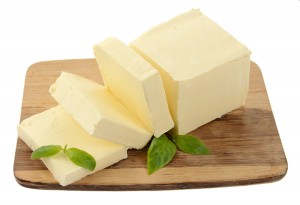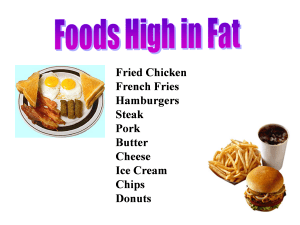Eat Butter? Cancer and Fats: Part One
June 23, 2014 | Author: Susan Silberstein PhD
Today’s June 23 cover story of Time Magazine, “Eat Butter,” may shock you! It explains why scientists were wrong when they labeled fat the culprit in America’s health crisis. Americans began cutting back on fat and replaced it with refined carbohydrates, and our health got worse! Rates of obesity, diabetes and cardiovascular disease have skyrocketed in the last 35 years.
While the article quite thoroughly and accurately traces the history of American dietary guidelines set in motion by the McGovern Commission in 1977 and the evolution of the various food guide pyramids endorsed by the Department of Agriculture (USDA), it addresses primarily obesity, diabetes and cardiovascular disease. Not a mention of cancer.
Actually, there is plenty of research on fats and cancer, and the issue is much more complex than whether we should get rid of fat and replace it with carbs. The fact is we all need fats for brain health, energy, hormone production, cell membrane integrity, and even immune system function. What’s relevant for overall health – and especially cancer protection — is determined by the amount of fat, the type of fat, and the quality of fat in our diets.
Amount of Fat
 As the China Study made abundantly clear, rates of cancer (as well as obesity and other chronic degenerative diseases) decrease on a “low fat” diet. Traditional plant-based diets such as the Asian diet contain only 15-20% of total calories from fat, whereas the modern western diet contains 45-50% or more calories from fat.
As the China Study made abundantly clear, rates of cancer (as well as obesity and other chronic degenerative diseases) decrease on a “low fat” diet. Traditional plant-based diets such as the Asian diet contain only 15-20% of total calories from fat, whereas the modern western diet contains 45-50% or more calories from fat.
Foods high in fat include fried chicken, French fries, cheese, hamburgers, steak, pork, ice cream, and chips – the mainstays of the American diet. High levels of dietary fat are linked to increased levels of sex hormones, carcinogens, and mutagens, because these compounds are lipophilic – they love the fat, they live in the fat, and they don’t easily metabolize out of the fat – so if you have a high fat diet or a lot of adipose (fatty) tissue on your body, you are getting a lot of these cancer-promoting compounds. According to the American Institute for Cancer Research, obesity is a risk factor in all kinds of cancers and also negatively affects survival.
Furthermore, fat is a threshold nutrient: Reducing fat down to 30% of total calories will not make an appreciable difference in cancer control. However, reducing it down to 15-20% of total calories works magic! That is why the Women’s Health Initiative Study, the results of which were released in 2005, was so disappointing when the researchers incorrectly concluded that a low-fat diet had no impact on risk for breast cancer. The “low fat” group was still consuming nearly 30% of calories from fat. There was also no distinction between the good and the bad fats.
But distinguish we must: Not only the amount of fat, but also the type of fat is important. In my next blog, I will discuss the types of fats that can make all the difference in terms of cancer protection or cancer promotion.
Join the conversation: Ask Holistic Cancer Coach Facebook Group
References:
[1] Walsh, B. Eat Butter. Time Magazine, June 23, 2014, 28-35
[2] Campbell TC. The China Study. Dallas, Benbella, 2006
[3] www.aicr.org/enews/2014/01-january/enews-obesity-cancer-need-to-know.html
[4] Silberstein, S. Kitchen Chemotherapy, Wynnewood, PA, Infinity, 2011
